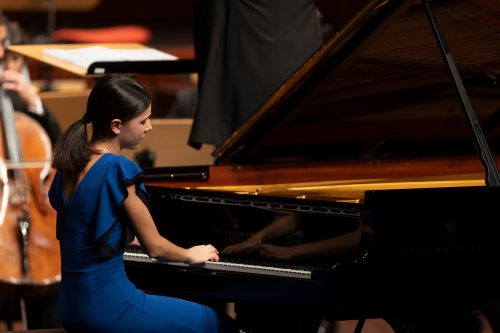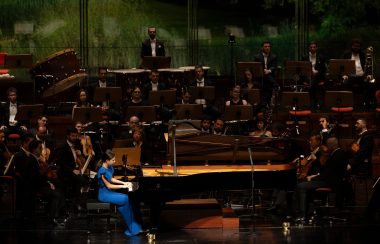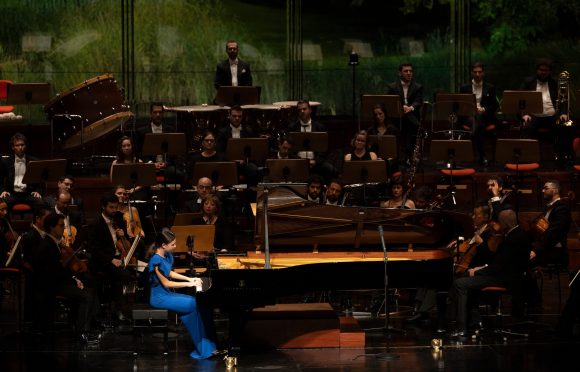 Portugal Sibelius, Chopin, Beethoven: Alexandra Dovgan (piano), Gulbenkian Orchestra / Risto Joost (conductor), Large Auditorium of the Gulbenkian Foundation, Lisbon, 9.11.2023. (GT)
Portugal Sibelius, Chopin, Beethoven: Alexandra Dovgan (piano), Gulbenkian Orchestra / Risto Joost (conductor), Large Auditorium of the Gulbenkian Foundation, Lisbon, 9.11.2023. (GT)

Sibelius – En Saga, Op.9
Chopin – Piano Concerto No.2 in F minor, Op.21
Beethoven -Symphony No.7 in A major, Op.92
To hear this orchestra playing at the Gulbenkian Museum offers a clue as to how this ensemble has developed into a world-class phenomenon – the acoustic values of this hall are state-of-the-art and are enhanced by the glass-walled backdrop, allowing the audience to see the trees and greenery outside thus presenting a perfect ambience both sonically and visually. The orchestra possesses a superb unity in performance throughout the different orchestral groups, especially in the violins and woodwinds – often playing as one instrument.
The orchestra is blessed throughout by outstanding musicians. This was manifestly clear in the atmospheric En Saga, with the playing enhanced superbly by the clarinet of Iva Barbosa, the bassoons of Ricardo Ramos and Vera Dias, and an exquisite viola solo by Samuel Barsegian. The Estonian conductor Risto Joost was unknown to me – he is not demonstrative – rather, he calmly handles tempo changes, bringing out all the themes clearly. This performance of En Saga was among the finest that I have heard and was an impressive start to this concert.
It was clear the main attraction here was the appearance of Alexandra Dovgan. She made her Lisbon debut last year – at the age of fourteen – in a recital of pieces by Schubert, Robert Schumann and Brahms, the success of which led to this invitation to play with the Gulbenkian Orchestra. This concert programme was repeated on the following evening, and notably, both concerts were fully booked.
I first heard Alexandra Dovgan four years ago, when she opened the International Piano Festival in Kazan, and I would not have expected that after the pandemic and when her country was at war, she would have enjoyed such progress in developing a major international career, yet this is what she has achieved. When I interviewed her after performing Mendelssohn’s Concerto No.1, apart from her extraordinary musicality, she impressed me enormously with her determination and ambition to become a professional pianist. In the last three years, she has played at Europe’s major musical capitals in both recitals and with outstanding orchestras and conductors. Soon, her first recording will appear and after leaving Moscow last year, she now lives in Malaga, Spain. It is clear that Alexandra Dovgan is already one of the most outstanding young pianists of our time.
Dovgan has steadily added to her concerto repertoire, and she walked on stage fully confident and notably before bowing to the audience, made a bow to the orchestra. Following the prolonged orchestral introduction and the appearance of the two main themes, Dovgan’s beautifully ornamented entry on the keyboard showed she was completely at home with this music; in her delivery of themes from bel canto opera, Dovgan evinced all the delicate legato of Chopin’s writing. Her affinity with the music was evident in showing her feelings on her face when portraying the most poetic passages.
In the slow movement (Larghetto) – inspired by Chopin’s passion for the singer Konstancja Gładkowska – Dovgan sensitively portrayed the composer’s poetry through her virtuosic passagework. It became clear also how Dovgan listened and responds to the orchestra, especially the woodwinds.
The poetry of Dovgan’s playing combined with her virtuosity at the keyboard was uncanny. One noticed how much she has progressed in such a short time; Dovgan has grown from a child prodigy to become a consummate artist embracing virtuosity and artistry. Her long arms often create an almost balletic impression in the more spirited passages, and rather than treating the piano as a percussive instrument, her hands pass over the keyboard gently recreating the music as if she is composing it herself.

In the finale (Allegro vivace), the violins and violas introduced a beautiful passage col legno – in the style of a mazurka – and ornamented with glittering virtuosity by the soloist in a lingering singing poetic melody, evincing all the elegance of this concerto. Following her reprise of the opening recitative now transformed into a lyrical rustic theme, the orchestra brought this performance to a grand close. I never expected to see the entire audience rise as one to applaud a young pianist as they did for this remarkable teenager – it was quite extraordinary, and the ovation continued for several minutes, indeed many of the musicians rose to applaud Dovgan. The reward was her encore Chopin’s Nocturne Op.9, No.1 in B-flat minor.
It seemed as if after the Chopin concerto – the main event of the evening had passed – but under the energetically dramatic direction of the Estonian conductor, the orchestra fashioned a remarkably moving performance of Beethoven’s Seventh Symphony – with little or no concessions to period performance – and in complete accord with the great rhythmic strength of this symphony. One was reminded why Wagner called this symphony the ‘apotheosis of the dance’. In the opening (Poco sostenuto-Vivace) there were some marvellous solo passages by Pedro Ribeiro on the oboe and on the flute of Cristina Ánchel, backed impressively by the strings and brass. The superb acoustics of the auditorium allowed one to hear everything so clearly and most notably the verdant richness of the superbly virtuosic strings playing as if one instrument.
In the second movement (Allegretto) the conductor impelled his musicians onwards bringing out all the forceful drama of the score – often racing the tempos onward, generating dramatic rhythm, and every musician playing as if their lives depended on it. In the third movement (Presto) the orchestra seemed a little deafening against the truthful acoustic picture of the hall, in generating all the passion and intensity of Beethoven’s music. The brilliance of playing continued into the finale (Allegro con brio) thrusting onwards to the magnificent triumphant climax.
This was a memorable concert, at the centre of which was Alexandra Dovgan’s poetically inspiring Chopin Second Piano Concerto, assisted nobly by the virtuosity and musicality of this world-class orchestra. There was a sense of hesitancy by many in the audience in leaving this beautiful hall in the knowledge that one had experienced a momentous musical event.
Gregor Tassie

I am not a musician. But I recognize something extraordinary when I hear it.